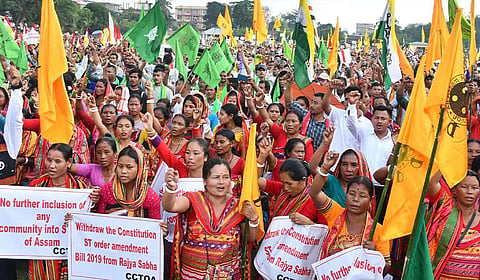
- Home
- Live Blog
- Breaking News
- Top Headlines
- Cities
- NE News
- Sentinel Media
- Sports
- Education
- Jobs

OUR CORRESPONDENT
KOKRAJHAR: Strongly opposing the move of the Government of Assam to grant ST status to six heterogeneous communities, the Bodoland Janajati Suraksha Manch (BJSM) urged all tribal ministers and MLAs to oppose the move or quit their posts if the government goes ahead with it. The manch expressed deep resentment over the move.
Working President of the BJSM DD Narzary said that the Chief Minister, Dr Himanta Biswa Sarma, had openly announced that the proposal to grant ST status to six communities would be brought in the upcoming assembly session on November 25. He also said the move would reflect complete disregard and humiliation towards the sentiments, identity, and constitutional rights of the indigenous tribal people of Assam. The BJSM views this as a calculated political design to weaken and endanger the sons of the soil in their own homeland.
"The present BJP-led Assam Government is deliberately pushing this agenda even though the six communities do not fulfil the Lokur Committee criteria nor the constitutional qualifications required for inclusion in the list of Scheduled Tribes", he said, adding that granting ST status to advanced and numerically larger communities will have disastrous consequences for the existing tribal population of Assam. He said that the tribals would be deprived of their constitutional safeguards, lose political representation, and eventually be sidelined and exploited socially, economically, and culturally.
Narzary said that the time had come that all tribal ministers and MLAs of Assam Assembly should strongly resist and defeat any resolution or introduction of the bill in favour of granting ST status to these six communities. He strongly condemned the recent media statements and warnings issued by certain leaders of the Ahom Students' Union (ASU) against tribal leaders opposing their ST demand. Such threatening remarks expose a dominating mindset and an attempt to suppress peaceful democratic voices, he added. He also said that the Ahom leaders must study their own history before challenging the legitimate concerns of tribals. The Ahoms are historically recorded to have entered Assam in 1228 AD under the leadership of Chaolung Sukapha and established rule by defeating the existing Boro-Kachari Kingdom and therefore, they cannot claim to be aboriginal tribes of Assam, he said, adding that according to Article 366 (25) read with Article 342 of the Constitution, only those communities recognized as tribes of the state can be included in the ST list. Furthermore, Ahoms also fail to meet the Lokur Committee criteria like the other five communities, he said.
"If historical arrival is taken as a basis for claiming Scheduled Tribe status, then by that same logic, the Ahoms' entry into Assam occurred much later than the Mughals. It is historically recorded that the Mughals first entered Assam in 1206 AD under the leadership of Muhammad Bakhtiyar Khilji - which was 22 years earlier than the Ahom arrival in 1228 AD and at that time, the Mech King Ali Mech along with large sections of Mech, Koch and Tharu tribes surrendered before Bakhtiyar Khilji and embraced Islam," Narzary said. "If the presence in Assam from an early historical period is the justification, then what prevents the descendants of Ali Mech and his converted followers, who have been in Assam since 1206 AD, from demanding ST status today? Would they not hold a stronger historical claim than the Ahoms?" he questioned and termed the arguments for ST status based merely on historical arrival as completely illogical and constitutionally unjustified.
Narzary said that the Ahom student leaders often claimed that Ahoms had significantly contributed to the formation of Assamese society but that they should recognize that the process of 'Assamization' began not with the Ahoms, but only in the 13th century, when the Mech King Durlabh Narayan invited seven Brahmin families and seven Kayastha families from Kanyakubja to Assam. "It was from this point that the Assamization policy started, which ultimately led to the division of Assam and also the fragmentation of the once-unified great Bodo (Boro-Kochari) nation into several sub-tribes and linguistic identities. Thus, claiming ownership of Assamese identity formation at the cost of the indigenous tribal population cannot be accepted as a ground for ST entitlement," he added.
BJSM warned that if the decision to grant ST status was taken, they would file legal petitions before the Supreme Court for protection of existing tribal rights and launch a statewide democratic mass movement along with all tribal organizations to safeguard constitutional protections guaranteed to Scheduled Tribes.
Also Read: BJSM urges ECI to delete names of illegal encroachers in tribal areas